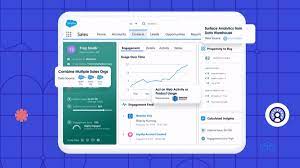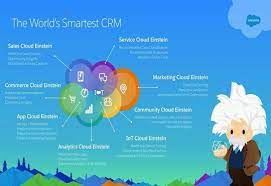Salesforce, the global leader in CRM, recently unveiled the next generation of Sales Cloud Einstein, Sales Cloud Einstein Forecasting, incorporating AI into every phase of the sales cycle, from pipeline building and deal closing to business growth. The new Einstein Forecasting tool enhances visibility and intelligence, enabling sales leaders to more accurately predict sales revenue at each stage. Additionally, Einstein Opportunity Scoring prioritizes high-value opportunities, and Einstein Email Insights identifies critical emails, allowing sales reps to sell faster and smarter. Introducing Einstein Forecasting Einstein Forecasting revolutionizes business predictability, benefiting everyone from the head of sales to the CFO. Traditional forecasting methods, often reliant on incomplete spreadsheets and outdated systems, result in inaccurate projections, underperformance, and business disconnection. In fact, less than half of deals close as forecasted, leading to missed quotas and revenue shortfalls. Sales Cloud Einstein Forecasting Einstein Forecasting is a fully automated, out-of-the-box solution utilizing a company’s historical CRM data to eliminate guesswork. By combining data mining and machine learning, it analyzes factors like seasonality and historical performance to deliver highly accurate, individualized sales forecasts. Its self-learning algorithms assess individual and team forecasting behaviors, adjusting for optimism or pessimism to provide unbiased analysis. Moreover, Einstein translates forecast data into human language, helping sales leaders understand pipeline expectations and reasons. For example, a regional manager for a trucking company can use a dashboard to see if the team is on track or if any deals are in jeopardy of not closing or being lost. This foresight allows for timely intervention. Similarly, a CFO considering expansion can use Einstein Forecasting to predict funding availability for new regions. Enhancing Sales Reps’ Efficiency with AI In addition to Einstein Forecasting, Salesforce introduced Einstein Opportunity Scoring and Einstein Email Insights to keep sales reps focused on vital deals. Einstein Opportunity Scoring Einstein Opportunity Scoring identifies, surfaces, and prioritizes the most valuable deals within Sales Cloud, such as those with large deal sizes and significant executive engagement. It monitors deals in progress, flagging high-value deals at risk, allowing reps to concentrate on building the pipeline and closing deals efficiently. For instance, sales reps can focus on the most promising deals instead of spending hours sifting through opportunities. Einstein Email Insights Einstein Email Insights acts as a personal email assistant for sales reps, powered by natural language processing (NLP). It identifies crucial emails and recommends actions or responses, helping reps prioritize their inbox and quickly address customer needs. This proactive approach ensures that deals continue moving forward, from scheduling meetings to sending quotes. For example, a sales rep returning from a day of meetings can quickly find and address important emails without sifting through their inbox. Benefits of Einstein Forecasting Einstein Forecasting leverages AI technology to bring certainty and visibility to forecasts, enhancing accuracy, predicting outcomes, and tracking team performance. Salesforce Einstein Celebrates One Year of Innovation Since its launch in September 2016, Salesforce Einstein has brought AI capabilities to every business user, transforming customer experiences across the Customer Success Platform. Today, Einstein delivers over 475 million daily predictions, enabling companies like U.S. Bank, Room&Board, FareCompare, Silverline, and Black Diamond to operate smarter and more productively. Additionally, Einstein Platform Services empower developers to build AI-powered CRM apps using computer vision and NLP, with over 7,000 developers already creating Einstein-powered apps. Under Chief Scientist Dr. Richard Socher, Salesforce Research has published 10 academic papers, advancing deep learning technology for Salesforce customers. Einstein Predictions Enabling Einstein Forecasting displays the Einstein prediction column on the forecasts page, showing median predicted amounts for each manager’s team based on opportunities within the Best Case and Commit forecast categories. Predictions may not appear if there is insufficient historical data or a large prediction range. Predictions are typically in US dollars unless multiple currencies are used, in which case amounts are converted based on the static conversion rate set by the Salesforce admin. Selecting a prediction value reveals detailed information in the side panel, including the prediction range, a breakdown of wins from existing and new deals, and top factors contributing to the prediction. The Forecast Changes Chart offers a visualization of predicted closings within a forecast period, highlighting key performance indicators. New Salesforce AI Innovation Fund To foster next-generation AI solutions, Salesforce Ventures announced a $50 million Salesforce AI Innovation Fund. Fast-growing AI startups Highspot, Squirro, and TalkIQ are the first recipients, accelerating their development of transformative AI solutions on Salesforce. Additionally, Salesforce Ventures has invested in All Turtles, an AI startup studio partnering with founding teams to create AI-centric products. Salesforce will collaborate with All Turtles to co-create advanced AI solutions on the Salesforce platform. Like1 Related Posts Salesforce OEM AppExchange Expanding its reach beyond CRM, Salesforce.com has launched a new service called AppExchange OEM Edition, aimed at non-CRM service providers. Read more The Salesforce Story In Marc Benioff’s own words How did salesforce.com grow from a start up in a rented apartment into the world’s Read more Salesforce Jigsaw Salesforce.com, a prominent figure in cloud computing, has finalized a deal to acquire Jigsaw, a wiki-style business contact database, for Read more Health Cloud Brings Healthcare Transformation Following swiftly after last week’s successful launch of Financial Services Cloud, Salesforce has announced the second installment in its series Read more











